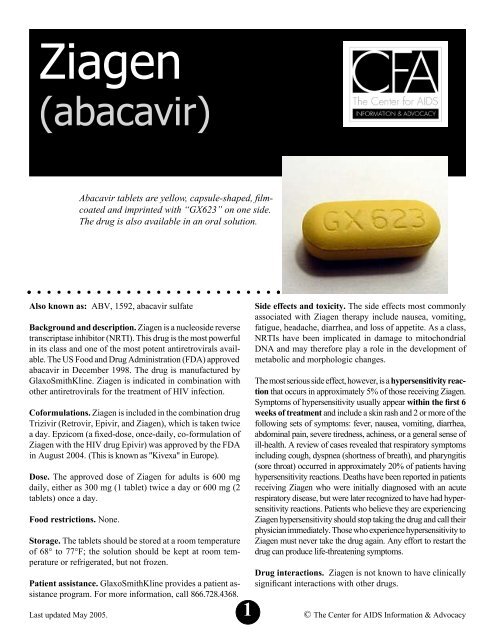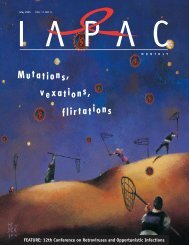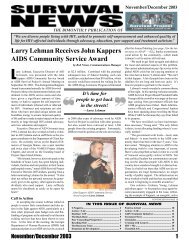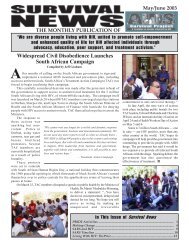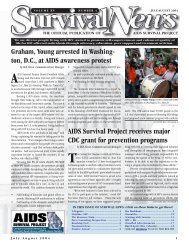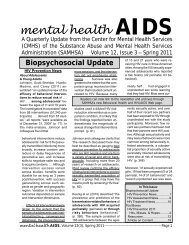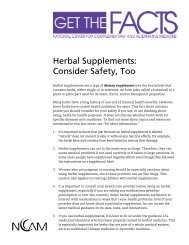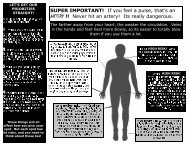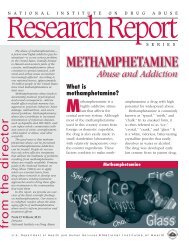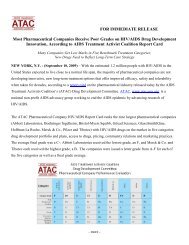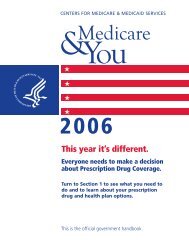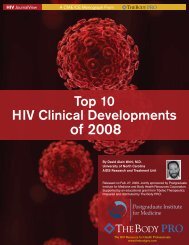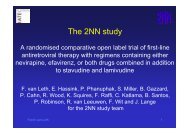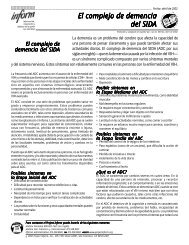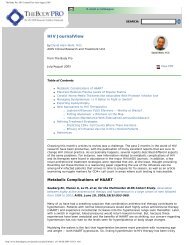Ziagen - CD8 T cells
Ziagen - CD8 T cells
Ziagen - CD8 T cells
You also want an ePaper? Increase the reach of your titles
YUMPU automatically turns print PDFs into web optimized ePapers that Google loves.
<strong>Ziagen</strong><br />
(abacavir)<br />
Abacavir tablets are yellow, capsule-shaped, fi lmcoated<br />
and imprinted with “GX623” on one side.<br />
The drug is also available in an oral solution.<br />
Also known as: ABV, 1592, abacavir sulfate<br />
Background and description. <strong>Ziagen</strong> is a nucleoside re verse<br />
transcriptase inhibitor (NRTI). This drug is the most pow er ful<br />
in its class and one of the most potent antiretrovirals available.<br />
The US Food and Drug Ad min is tra tion (FDA) ap proved<br />
abacavir in December 1998. The drug is man u fac tured by<br />
GlaxoSmithKline. <strong>Ziagen</strong> is indicated in com bi na tion with<br />
other antiretrovirals for the treatment of HIV infection.<br />
Coformulations. <strong>Ziagen</strong> is included in the com bi na tion drug<br />
Trizivir (Retrovir, Epivir, and <strong>Ziagen</strong>), which is taken twice<br />
a day. Epzicom (a fi xed-dose, once-daily, co-formulation of<br />
<strong>Ziagen</strong> with the HIV drug Epivir) was approved by the FDA<br />
in August 2004. (This is known as "Kivexa" in Europe).<br />
Dose. The approved dose of <strong>Ziagen</strong> for adults is 600 mg<br />
daily, either as 300 mg (1 tablet) twice a day or 600 mg (2<br />
tablets) once a day.<br />
Food restrictions. None.<br />
Storage. The tablets should be stored at a room tem per a ture<br />
of 68° to 77°F; the solution should be kept at room temper<br />
a ture or refrigerated, but not frozen.<br />
Patient assistance. GlaxoSmithKline provides a patient assis<br />
tance program. For more information, call 866.728.4368.<br />
1<br />
Side effects and toxicity. The side effects most com mon ly<br />
associated with <strong>Ziagen</strong> therapy include nausea, vomiting,<br />
fa tigue, headache, diarrhea, and loss of appetite. As a class,<br />
NRTIs have been implicated in damage to mitochondrial<br />
DNA and may therefore play a role in the development of<br />
met a bol ic and morphologic changes.<br />
The most serious side ef fect, how ev er, is a hypersensitivity reaction<br />
that occurs in ap prox i mate ly 5% of those receiving <strong>Ziagen</strong>.<br />
Symptoms of hypersensitivity usually ap pear within the fi rst 6<br />
weeks of treatment and include a skin rash and 2 or more of the<br />
fol low ing sets of symptoms: fever, nausea, vom it ing, diarrhea,<br />
abdominal pain, severe tired ness, achiness, or a gen er al sense of<br />
ill-health. A review of cases revealed that res pi ra to ry symp toms<br />
including cough, dyspnea (short ness of breath), and phar yn gi tis<br />
(sore throat) occurred in ap prox i mate ly 20% of patients having<br />
hy per sen si tiv i ty re ac tions. Deaths have been reported in patients<br />
re ceiv ing <strong>Ziagen</strong> who were ini tial ly diagnosed with an acute<br />
res pi ra to ry disease, but were later recognized to have had hy per -<br />
sen si tiv i ty re ac tions. Patients who believe they are experiencing<br />
<strong>Ziagen</strong> hy per sen si tiv i ty should stop taking the drug and call their<br />
phy si cian im me di ate ly. Those who ex pe ri ence hy per sen si tiv i ty to<br />
<strong>Ziagen</strong> must never take the drug again. Any effort to re start the<br />
drug can pro duce life-threat en ing symp toms.<br />
Drug interactions. <strong>Ziagen</strong> is not known to have clin i cal ly<br />
signifi cant interactions with other drugs.<br />
Last updated May 2005. © The Center for AIDS Information & Advocacy
Additional info:<br />
<strong>Ziagen</strong> (abacavir)<br />
Resistance and cross-resistance. Patients who have used and developed resistance to multiple<br />
NRTIs are unlikely to reduce their viral load with the use of <strong>Ziagen</strong>. On the other hand, patients who<br />
have used and developed resistance to only 2 NRTIs may see signifi cant reductions in viral load<br />
when <strong>Ziagen</strong> is com bined with other drugs. In a Glaxo-sponsored expanded access program, which<br />
provided the drug to patients with advanced disease and few treatment options, <strong>Ziagen</strong> produced a<br />
0.5 log re duc tion in viral load for only 1 in 4 patients.<br />
Clinical data. In a pivotal study of abacavir, a team of Glaxo investigators ran dom ized 86 patients<br />
to a regimen of Retrovir/Epivir and another 87 to a combination of <strong>Ziagen</strong>/Retrovir/Epivir.<br />
Par tic i pants were required to be naïve to antiretroviral therapy. The median baseline viral load<br />
among the sub jects was approximately 38,000 copies/mL, while the median baseline CD4 T cell<br />
count was ap prox i mate ly 450 <strong>cells</strong>/mm 3 . At the end of the fi rst 16 weeks, which were double-blind,<br />
ap prox i mate ly 80% of the subjects in the 3-drug arm had undetectable viral loads (less than 400<br />
copies/mL). Unsurprisingly, less than 40% of the subjects in the double-NRTI com par i son arm<br />
had undetectable plas ma viremia. By week 48, ap prox i mate ly 60% of the triple-therapy subjects<br />
still had undetectable viral loads; however, par tic i pants with a baseline viral load of greater than<br />
100,000 copies/mL were much less likely than other subjects to achieve undetectable viremia with<br />
the use of <strong>Ziagen</strong>. Glaxo reported that only 6% of the subjects assigned to the 3-drug group withdrew<br />
from study for adverse events.<br />
For those who have been heavily treated with other NRTIs, <strong>Ziagen</strong> may have limited utility because<br />
of pre-existing resistance. However, for patients with limited or no NRTI experience, this nucleoside<br />
offers a potent, convenient, and generally well-tolerated choice.<br />
To contact The Cen ter for AIDS,<br />
call 713.527.8219 or toll free<br />
888.341.1788.<br />
P.O. BOX 66306<br />
HOUSTON, TEXAS 77266-6306<br />
1407 HAWTHORNE STREET<br />
HOUSTON, TEXAS 77006<br />
E-mail: info@centerforaids.org<br />
Website: www.centerforaids.org<br />
Last updated May 2005. 2<br />
© The Center for AIDS Information & Advocacy


